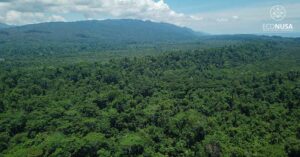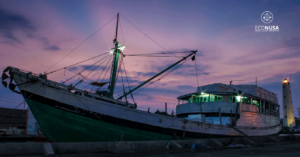
Education is deemed vital to ensure development in Indonesia equally reaches the eastern Indonesia like the Land of Papua. It is not merely physical development but also human resources development that need improvement with local context and necessity. Bolstering education will go to raising awareness of other aspect including environmental and food security issues.
The notion came up on the talk show entitling “Understand Papua: Papuans’ Various Works in Indonesia” at the University of Indonesia’s Pusgiwa hall in Depok, West Java, on February 27, 2020. More than five hundreds participants consisting of students, academics, and community attending the venue. The talk show was held by EcoNusa foundation in collaboration with the University of Indonesia’s Academic and Students Affairs Department. President University’s lecturer and youngest Papuan doctorate graduate, Jean Richard Jokhu, Institut Kalaway Muda Director, Nanny Uswanas, Papuan social activist, Ronald Manoach, and young farmer and Bentara Papua’s member, Grison Krey also attended the event.
The Central Statistics Agency (BPS) web reports that the Human Development Index (HDI) of Papua and West Papua Provinces in 2018 were on the lowermost ranks in Indonesia with 60.06 and 63.74 indices respectively. Both provinces have always been on the far end since 2011. Jean said that education needs bolstering to improve the university graduate’s quality in the Land of Papua. This condition is due to the absence of an ‘A’ certified university or study program in the Land of Papua.
“One of the complexities in the Land of Papua deals with education. There is no ‘A’ certified university, and neither is study program. I have a dream to teach in Papua in the future,” said Jean.
Jean said the community in the Land of Papua could get benefit from their abundant natural resources. Agriculture should not stop at the utilization of raw material but continue to the processing for higher economic values. Besides, intensifying agriculture could also improve production yields.
“(Local philosophy says) that if you could grow banana tree than you could live only from banana should be forgotten. If banana crop is done, then it should move to coffee or other crops. We should introduce this mindset to customary institution and the customary chief,” added Jean.
Jean expected that one day the indigenous community of Papua could become ‘self-reliant’ to work out the results of technology, instead of simply ‘bending down’ or cultivating agricultural crops, planting paddy or others. Being self-reliance implies that one can build an aircraft. We create ‘Wakanda’ if possible in Papua,” said Jean.
In addition, Grison Krey, was of the opinion that education has an essential role to raise public awareness for being independent. As a young farmer, Grison considered that the Papuan community should optimize the land cultivation for agriculture for their livelihood. To date, most of vegetables and fruits is supplied by immigrants.
“Only few of young people here is willing to be a farmer. Most of them has a dream to get a job as a civil servant. I try to provide assistant for organic agriculture and motivate young people to become farmers so that they can cultivate their own land,” said Grison.
Grison’s strongest drive to become a farmer is his willingness to cultivate the fertile land of Papua. This is reflected from Grison’s own song lyrics as saying … Your wealth spreads out widely/fertile land as source of life/unlimited spirit of peasant/towards their land … adopted from his song entitled “Surga Kecil (Little Heaven)”.
“Young Papuans’ commitment should be maintained. We have rich potential but natural resources in Papua are not cultivated yet,” said Grison.
To create self-reliance in the land of Papua, a Papuan social activist, Ronald Manoach, said that strong leadership is needed to ensure an effective, emancipatory and controllable development. According to Ronald, a qualified leader could be produced from the result of democratic election of regional head. Such leader should provide decent place to the local Papuan peoples so that they can develop their homelands.
“Our prerequisites for being a wealth and just country are enough. There is enough natural resources and it depends on the opportunity given. It could happen only when our democracy process is qualified,” said Ronald.
Editor: Leo Wahyudi







